Hello and welcome (back),
I hope you’ve had a good week, wherever you may be, and if you haven’t seen this piece of historical news, developers in London recently discovered one of the largest pieces of Roman wall decoration ever found in Britain.
The Roman connection is fitting as this week I’m still mulling over Italy. Good travel stays with us long after we get home. One particularly enjoyable experience was a half-day visit to Verona. I had never been before but was excited to see a city with much to offer.
In fair Verona…
It has well-preserved (and restored) medieval walls, plenty of fancy city architecture and a Roman amphitheatre that Verona maintains is better (and older) than the colosseum. It is older, and usually, when people tell me that something Roman in their Italian city is better, bigger, lovelier or more famous than the equivalent version in Rome, I assume that this is just local loyalty. But in this case, I’d say that Verona has a case. I’m not going to adjudicate but the amphitheater is very lovely. It has most of the same features as the colosseum, plus a cute pink-and-white stripe effect as a result of the local stones. Plus it is still in regular use as an open-air music venue.
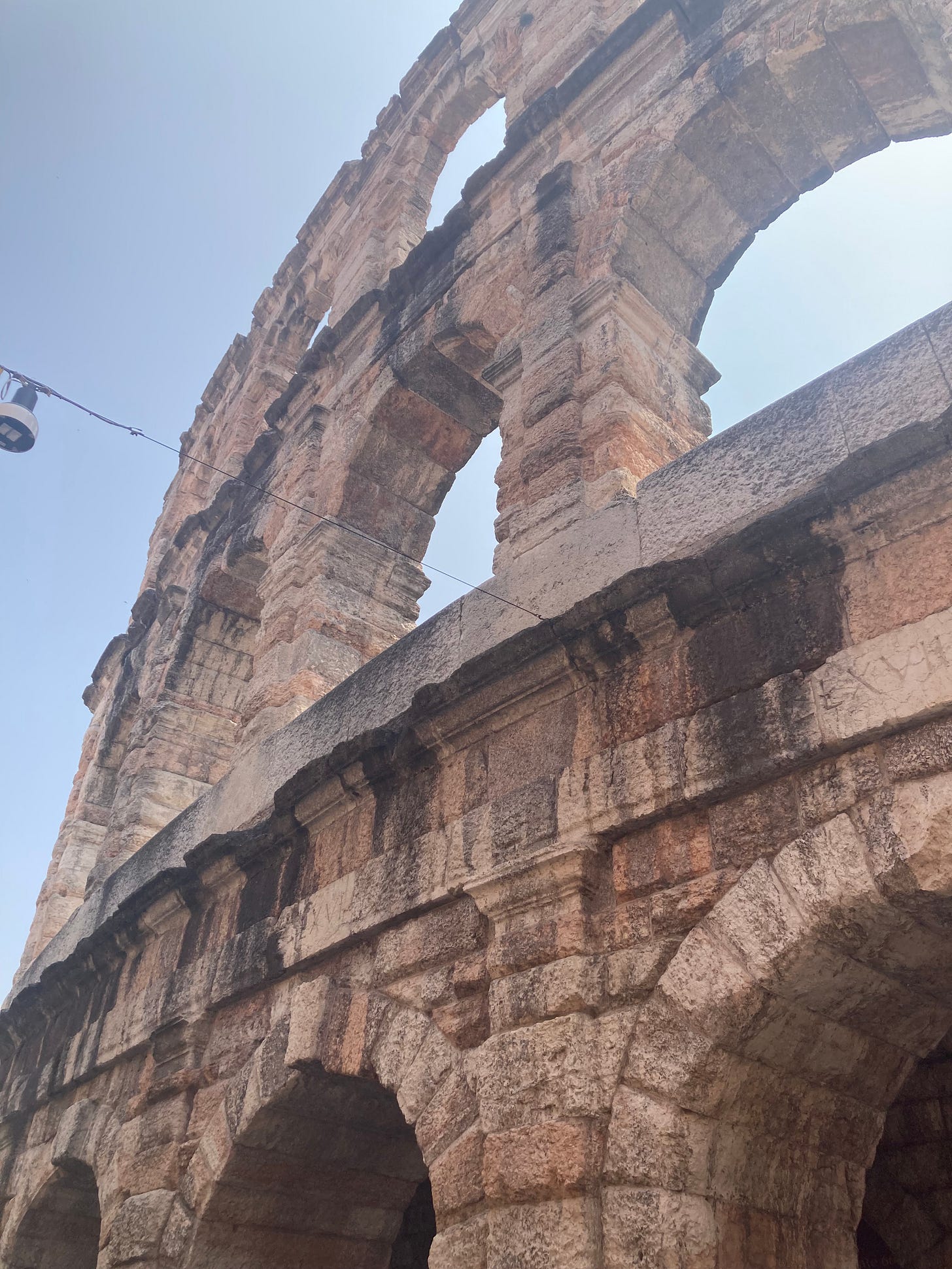
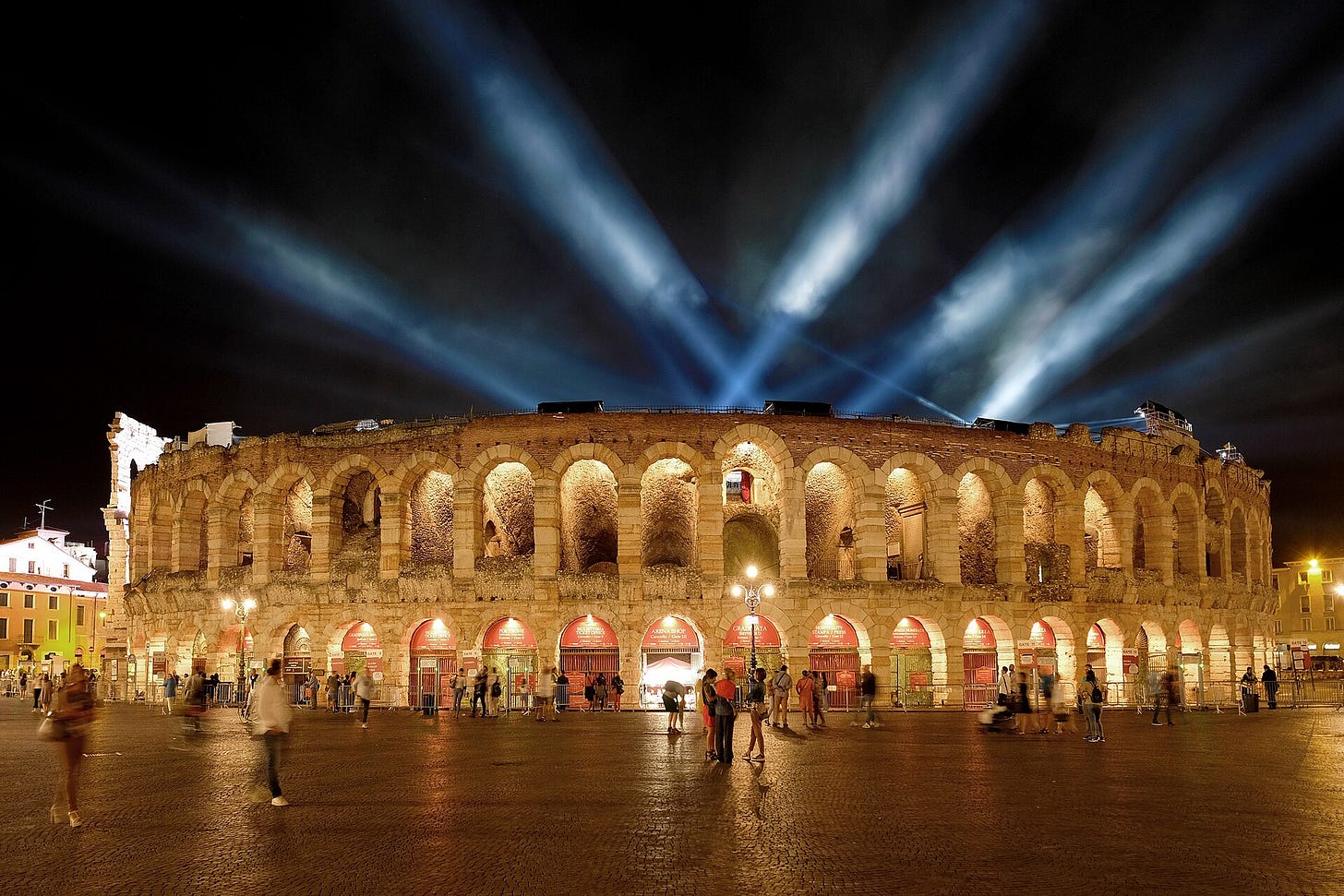
There is also a fascinating Jewish quarter, including the documented edges of the ghetto, or enclosed Jewish residential area of the late Middle Ages and early modern period, but also a large synagogue started in the 1860s but completed in 1928-29, built after the ghetto walls came down and very much in the style of upmarket 1920s Verona. More than any other city I’ve visited in Italy, the terrible losses of the Jewish community in Verona in the 1940s stand out sharp against a longer history of uncertainty and intermittent isolation but also a sense of how significant and present that community might have been only a short time before each burst of persection. It was a powerful reminder of how quickly normality can change and how fragile can be the freedom simply to exist.
It was fiercely hot while we were in the city but, walking from one patch of shade to another, listening to our wonderful local guide, it was still possible to get a feel for the distinctiveness of the place.
The city and the city
One thing, though, permeated everywhere in Verona’s historical centre and it was, frankly, among the most bizarre I have witnessed as a historian: Romeo and Juliet tourism.
You can visit:
the ‘original’ balcony of Juliet (‘What light through yonder window breaks? It is the east and Juliet is the sun!’);
the house of the Montagues (‘And, Montague, come you this afternoon, To know our further pleasure in this case, To old Free-town, our common judgment-place’);
an enterprising hotel that has stuck a statue of Juliet in one of its balconies, in case you aren’t feeling up to the walk to the ‘original’;
a (replica) statue of Juliet, which apparently delivers good luck to those who grope her breasts. (The ‘original’ had to be retired because people actually groped a hole through it);
a lot of graffiti, mostly declaring the love between couples, one the walls of the ‘house of Juliet’, including on the sign asking people not to deface a historic building;
a wall of chewing gum, somehow associated with love and romance, that people actually have their photo taken in front of. (I try not to be judgemental about weird things humans do. We’re a weird species and I love that, but this was one of the most revolting things I have ever beheld and a case study I plan to whip out the next time somebody tries to explain to me that modern western society is somehow more ‘evolved’, ‘sophisticated’ or ‘rational’ than either other parts of the modern world or anywhere in the past.)
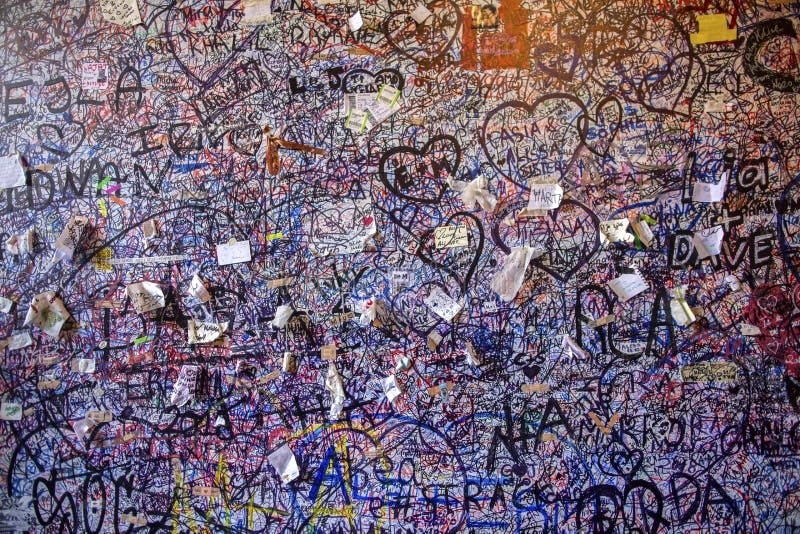
Plus, given the peculiar association of Romeo and Juliet with deep romantic love, Verona is also stuffed with shops selling things shaped like love hearts, covered in love hearts or otherwise themed like a Valentine’s Day window display on speed (and let’s not even get into what Valentine would have thought of how his sainthood is now remembered).
And then there are the love locks. Hardly a railing or bridge in the city doesn’t have at least a cluster of padlocks hanging off it, often with initials and declarations of love engraved or Sharpie-marked on them. Every so often the Muncipality has to go around shearing the things off before structures collapse. The deal used to be (and this is quite a recent tradition) that couples would go somewhere together to fasten the lock, usually on a bridge, then throw the key into the water below, thus sealing their undying love. Whether true or not, I appreciated the comment from our guide that, these days, the savvy use combination locks so they have the option of changing their minds later!
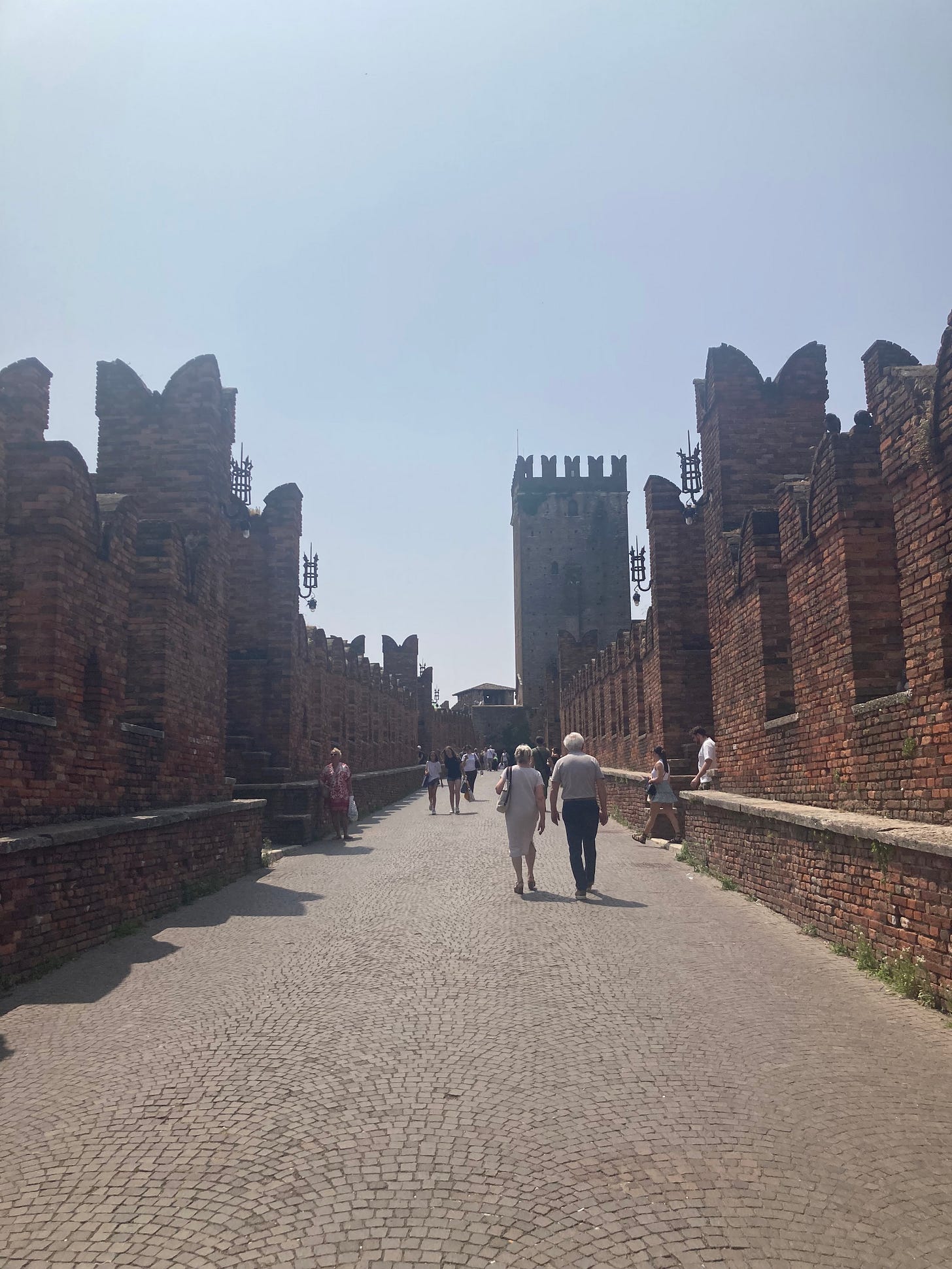
Still, all of this gives Verona a quite surreal quality. A perfectly fascinating, beautiful Italian city (Dante spent much of his career in exile here, so it isn’t short of its own literary glory), exists alongside a strange parallel universe dedicated to a pecular ideal of ‘love’, in the form of overwrought teen suicide, in which people eagerly seek out the ‘original’ balcony on which a fictional character never stood. As one of my fellow travellers said, ‘What do we actually mean by ‘original’ in this context?’. Believe it or not, though, the Verona of Romeo and Juliet gets stranger still.
A dance of fact and fiction
First of all, and as our guide, and sign boards around the city, were keen to point out, the story of Romeo and Juliet did not originate with Shakespeare, which is not controversial among literary scholars but isn’t necessarily widely known by people who simply enjoy the play.
Collections of Italian stories were circulating around Europe, in translation into various languages, around the turn of the 16th century. They included the tale of two young lovers from enemy houses, meeting their tragic end. If you’ve ever wondered why Shakespeare who, as far as we know, never set foot in Italy, still wrote ‘The Merchant of Venice’ and ‘Two Gentlemen of Verona’, and set several other plays in Italy (‘Much Ado About Nothing’: Messina; ‘The Taming of the Shrew’: Padua; ‘All’s Well that Ends Well’: partially set in mainland Italy; ‘The Winter’s Tale’: partially set in Sicily; ‘Othello’; Venice), these story collections appear to be the reason. Exotic European destinations were very much the literary rage, so Shakespeare was able to riff off similar collections circulating about Spain, Greece and the Balkans for other plays, too.
But Romeo and Juliet we know came from Italy. And, because it originally was, we presume, written for a local audience, it is rooted in historical fact: there were two households, both roughly alike in dignity (at least if the houses they owned are any indication), called the Montagues and Capulets (or Dal Capellos), in fair Verona. The odds are good that they really were in competition with one another because inter-family conflict was one of the ways that Italian city states functioned in the 15th century. And they produced various offspring, one of whom actually does seem to have been called Juliette of the house of Dal Capello. And those various offspring presumably fell in love with people their parents did not approve of, because that is one of the ways that human beings have functioned since the beginning of recorded history.
After that, the specifics would appear to be the imaginings of one or more local authors, poets or singers, eventually elaborated on by Shakespeare, sitting in his gloomy garret in London, day-dreaming of sunnier climes.
So, one layer of ‘even weirder’: we know that there is a Veronese foundation to the story of Romeo and Juliet… but it is still fictional. There is no evidence that a Juliette dal Capello, even if she existed, ever made eyes at a Romeo Montague (who we have no evidence existed), or that those ill-fated glances finished up with two dead adolescents in a crypt. And frankly, thank goodness! Shakespeare does wonderful things with the material but it is a grim story.
By the command of the Duke
But the weirdness continues. Why, you may wonder, has Verona so enthusiastically embraced a touristic obsession with a play by a man who never saw went there, about events that never took place there? In ‘Romeo and Juliet’, it is the Prince of Verona who itervenes at specific moments, giving commands that drive the tragic tale to its bitter end. In more recent history, a duke is to blame.
It isn’t that Mussolini, the leader of Fascist Italy in the mid-20th century, il Duce to his followers, had a particular soft spot for either Shakespeare or love-heart themed candy, but he did see the possibilities for tourism as a way to burnish the reputation of his government and Fascist ideology. Tourist initiatives included ‘war tours’ to celebrate and commemorate Italian experiences of the First World War, both for fellow Italians and foreigners. And il Duce was keen that cities and regions identify and promote their own unique heritage.
For Verona, this meant an awesome Roman amphitheatre, some great walls and… courtesy of a lavish MGM Studios Hollwood production, with extensive on-location filming, released in 1936, Romeo and Juliet. Archives were searched, documents pored over, until the courtyard was found of the house where the ‘real’ Capulets lived. The movie director insisted on panoramic shots of the city in the film’s opening sequences and hired scholars and archivists to identify the ‘real’ coats of arms of the play’s characters. As well as the house of the Capulets, another house was linked to the Montagues, though that identification has now been called into question.
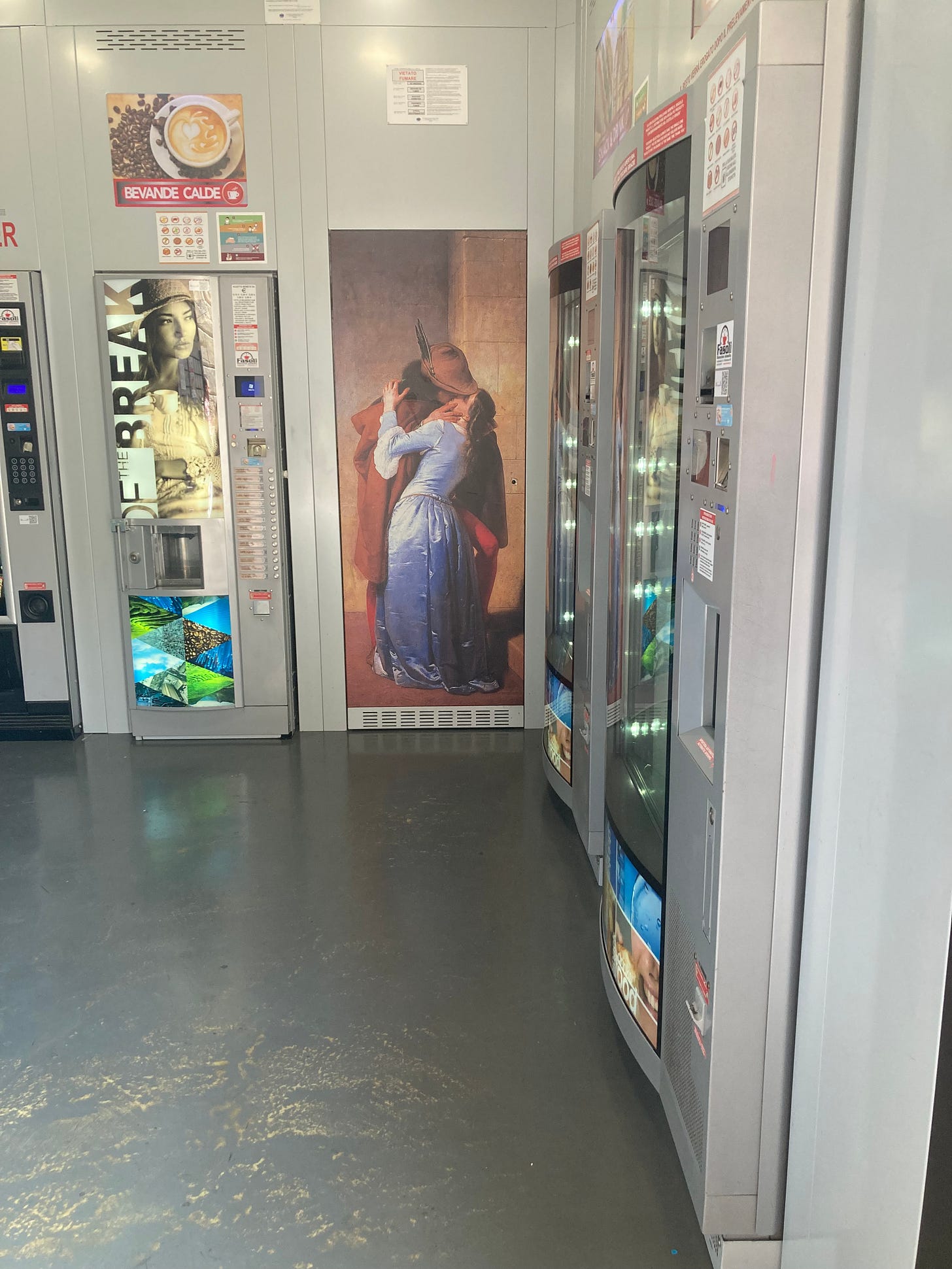
My first reaction to all of this, as you can probably tell, was mild horror, followed by a sort of horrified fascination, and honestly that is still where I am with a lot of it. And yet, there is something about it that reminds me strongly of the texts people in the Middle Ages (and Antiquity) wrote to make sense of their world, too. Read Herodotus or the Persian Book of Kings or any medieval poem about a place or a journey and you will be almost guaranteed to be told that ‘this was the place where [some legend or myth] happened’.
As a historian I may find the flirtation throughout Verona with a history that never happened a bit perplexing, especially in a place where so much interesting history did happen. But as a historian Verona is also a useful reminder that people have always mapped our world with the unreal as well as the real, Fiction and history have always walked hand in hand, different yet connected: a pair of star-crossed lovers giving meaning to the places we inhabit.1
There’s no excuse for the gum wall, though. Eew!





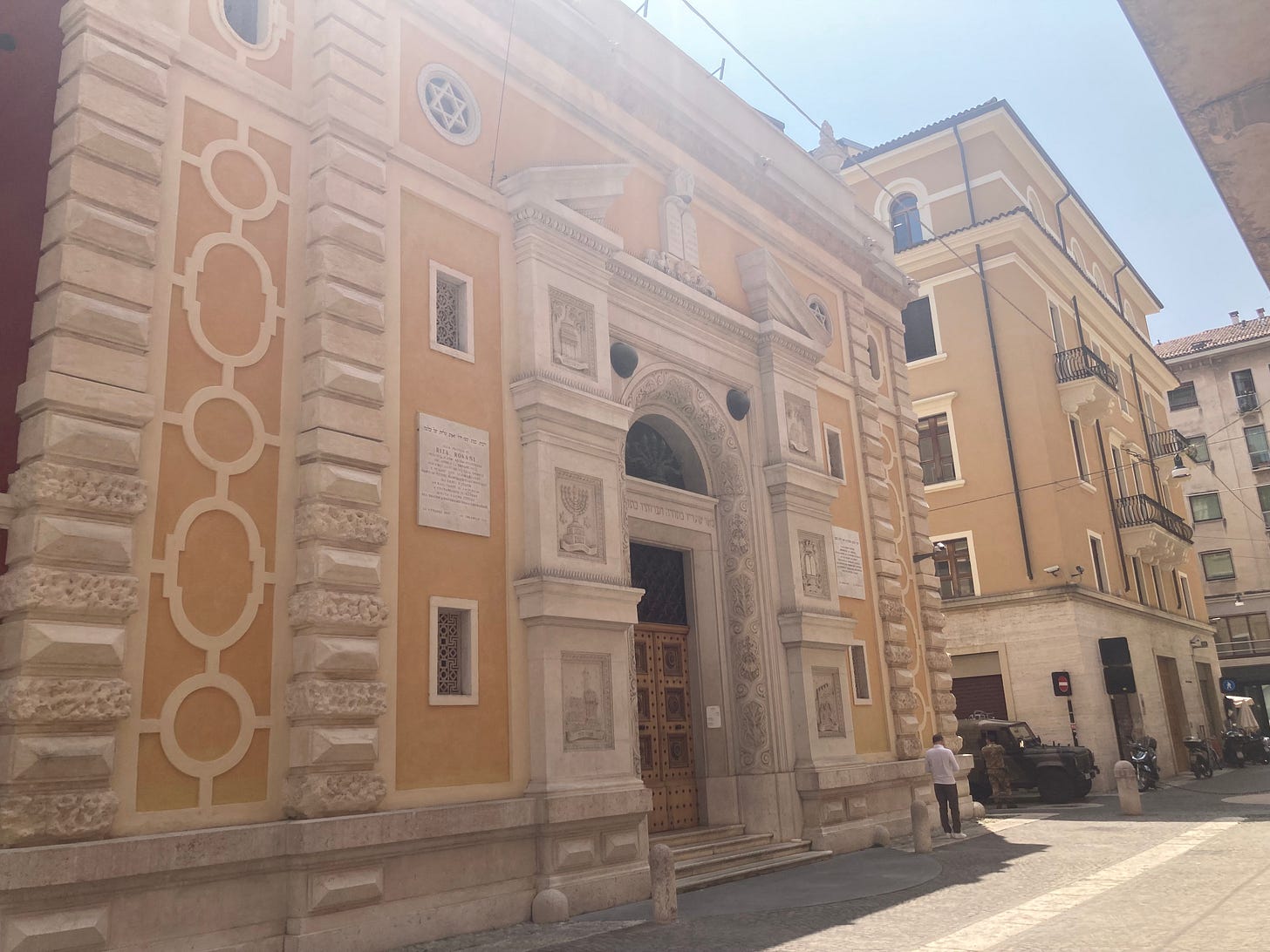
This was a delightful read! It brought me back to a layover I had for a few hours in Verona. I was there from 9pm to 11pm and had just rained and the whole place felt completely surreal with old stone and glistening cobblestone streets.
As a massive fan of Romeo and Juliet, I was delighted to see the "actual" balcony. I find the interplay between fiction and reality fascinating. It's wonderful to me that the stories we tell to better make sense of the human experience can end up impacting tangible places, scientific advancements, and cultural shifts. And I really appreciated your perspective on all of this as a historian!
You have captured the Romeo and Juliet weirdness of Verona that I also felt, and I didn’t even see the chewing gum wall! Something I wondered is whether all this Shakespeare idolatry was aimed at foreigners, English-speakers in particular, or whether Italians have adopted Shakespeare as their own. I’ve met Germans and Russians who are convinced Shakespeare couldn’t possibly have been English, he had to have been German or Russian. That’s how deeply his plays, in often-wonderful translations, have become part of their own culture. And yes, it does seem that Italians have their own myth of Shakespeare being an Italian. The book “Shakespeare Era Italiano” argues he was born in Messina, his family emigrated to England to escape the Inquisition, on their way the boy fell in love with Giuletta, etc, etc. Everyone wants a piece of him.